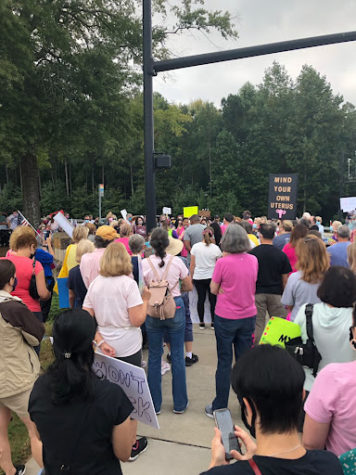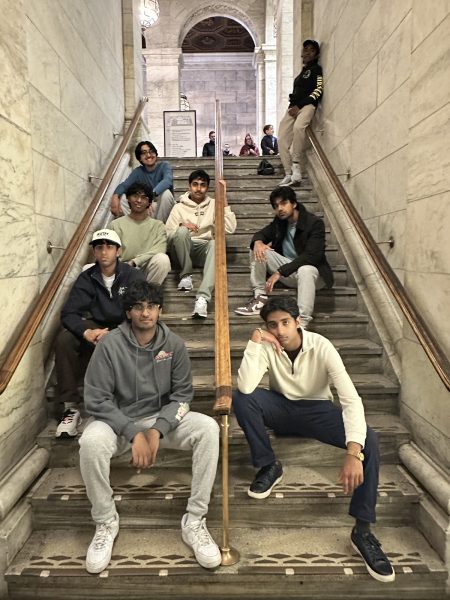Roe v. Wade: A Full Picture

Protesters gather outside the Supreme Court in Washington, DC, after the court’s unprecedented draft overturning Roe v. Wade was leaked. (Flicker/jonathan mosh)
On June 4, the United States Supreme Court overturned Roe v. Wade, a decision that now gives individual states the ability to make their own policies on abortion instead of constitutionally protecting the right to abortion that the court case once provided.

When Roe v. Wade was initially decided in 1973, long debates about ethics, rights and access to abortion arose. Now, nearly half a century later, debates have only intensified.
The Effects of the Overturn
Many see the overturning of this federal landmark as a violation of basic women’s rights.
Sexual assault, illness, and lack of financial resources are cited as reasons why women get abortions, and why they should have a choice as to whether they would like to bear a child.
However, pro-lifers continue to cite adoption as an overarching answer to these concerns.
“It is understandable that not all mothers can bear the responsibility to take care of a child,” a Lambert freshman said. “However, there are options such as adoption that have been made available for these women.”
However, the controversy over abortion conjures the topic of racial disparities associated with women who seek abortion care.
According to the Kaiser Family Foundation, in 2019, Black women accounted for almost four out of ten abortions, followed by White women (33%), Hispanic women (15%) and women of other racial and ethnic groupings (7%). Black women had the highest abortion rates at 23.8 per 1,000, followed by Hispanic women (11.7), and White women (6.6). There was no available data for other racial or ethnic groupings.
Black Americans in particular are disproportionately more likely than other Americans to reside in areas of poverty and have limited access to contraception. Socioeconomic disadvantages make it more difficult for black women seeking abortions to travel out of state or out of the county to receive an abortion.
Overturning Roe v. Wade also has an effect on the disparities between people with different socioeconomic backgrounds upon studies.
According to a 2018 study by DG Foster, half of the women who seek abortions live below the federal poverty level and three-quarters have trouble affording food, housing, and transportation. Abortion services being denied worsens this burden.
When Does Life Begin?
Pro-lifers and pro-choicers often discuss the sole question of when life begins. The majority of the time, there is no common ground in these conversations, but scientists and physicians have given some insight.
Many pro-life activists believe that life begins at conception. The precedent set by Roe v. Wade forced the Supreme Court to determine precisely when life begins.
“I believe that every life is sacred, including the ones that are not yet born,” said Lambert junior Armaan Bhasin. “‘Your body, your choice doesn’t necessarily apply to this issue as there is now a separate body inside you. Obviously, there is still an exception for if the mother could die from birth.”
According to the United States Conference of Catholic Bishops,
“In the 19th century, in virtually every state and territory, laws were enacted to define abortion as a crime throughout pregnancy. They contained only narrow exceptions, generally permitting abortion only if necessary to preserve the mother’s life. The primary reason for stricter abortion laws, according to their legislative history, was to afford greater protection to unborn children.”
Many disagree, stating that promoting the idea that women must be in danger to have a choice goes against the principles of gender equality and human rights.
On the other hand, there are still many who support the overturning of Roe v. Wade but believe that exceptions based on various situations must be considered.
“I feel like it’s a step in the right direction, however, I feel like it leaves too much up to chance,” Bhasin said. “Any abortion ban should have some exceptions, and this reversal lets any state not even provide those basic exceptions.”
According to the American College of Pediatricians, “The predominance of human biological research confirms that human life begins at conception—fertilization. At fertilization, the human being emerges as a whole, genetically distinct, individuated zygotic living human organism, a member of the species homo sapiens, needing only the proper environment in order to grow and develop.”
There is a multitude of arguments regarding when human life begins. This is a crucial distinction that must be made in order to discuss abortion rights.
Abortion as a Right
Regardless of one’s stance, it is clear that the debate about abortion care is long withstanding and continuous amongst citizens and the highest courts in the nation.
“We are taking healthcare rights away from people,” Lambert’s Human Rights Campaign Founder and President Shivangi Panda said. “It’s just basic healthcare rights that we should all have access to and we don’t.”
Since the decision was overturned, protests have gained international attention, arguing that it is an infringement on women’s rights, basic human rights and access to healthcare. Many who see this as a setback have also shown concern for the jeopardy of losing LGBTQ rights and possibly the right to interracial marriage.
On September 13th, 2022, South Carolina Senator Lindsey Graham proposed a bill that would ban abortion nationally after 15 weeks of pregnancy. Democrats were immediately outraged, and they interpreted Graham’s proposal as a symbolic act to galvanize a Republican base before the midterm elections as the bill has no chance of passage through a democratically controlled Congress.
Reaching compromise and safety for women during this process should be the first priority. Questions such as when life truly begins, who should have the decision over women’s healthcare and discretion between when abortions should be performed should continue to be researched and discussed to find an appropriate solution to this issue.
Your donation will help support The Lambert Post, Lambert High Schools student-run newspaper! Your contribution will allow us to purchase equipment and cover website hosting costs.












